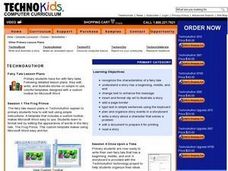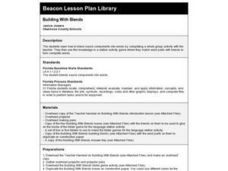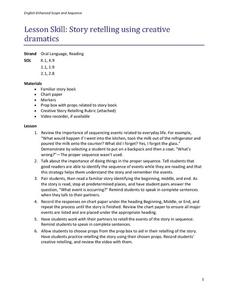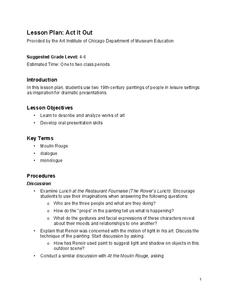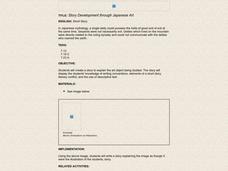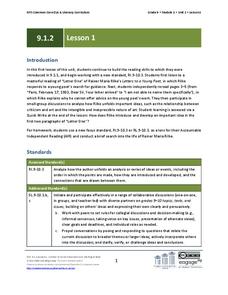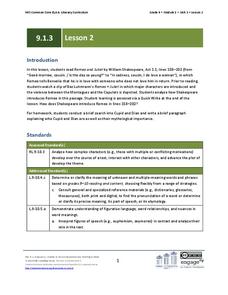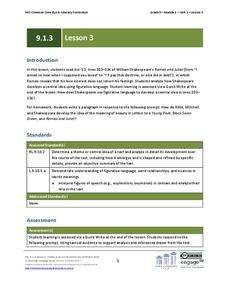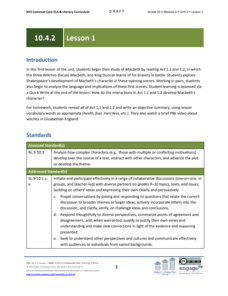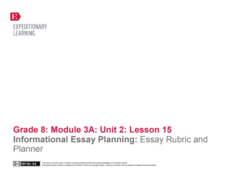Curated OER
Techno Author
Here is a great way to explore language arts by completing a computer activity with classmates. Youngsters read a fairy tale in class and analyze where the beginning, middle and end are. They create their own story using clip art and...
Curated OER
Building With Blends
Understanding consonant blends is crucial for young readers. In this language arts instructional activity, students examine consonant blends, and play the folder game, "Building With Blends," in small groups. The game is especially...
Curated OER
Hieroglyphic Art Project
Students translate words and ideas into pictures. They make a list of words or phrases that could be drawn as symbols. Students complete this as part of a project on Egyptian and other civilizations that used hieroglyphics. They use...
Curated OER
Guided Reading with Jazz Baby
Jazz music and musicians are the focus of this language arts lesson. Young readers independently read the book Jazz Baby. To build fluency and independence they read silently, but are guided by directive comments from the teacher. They...
Curated OER
Poet Analysis: Ciaran Carson
Students analyze lyrics and narration by reading poetry. In this language arts lesson, students read and examine the poem Belfast Confetti. Students discuss the topics and questions asked by the author Ciaran Carson.
Curated OER
Discussing Poetry In Class
Students investigate syllabic metre and rhyming techniques by analyzing poetry. In this language arts lesson, students read the poem Considering the Snail and discuss the nature and mood of the poem with their classmates. Students...
Curated OER
Building Vocabulary Quadrant Charts
This clever language arts lesson plan invites pupils to read verses of poetry, then construct vocabulary quadrants on index cards. The cards are divided up into 4 sections: Word, Meaning, Opposite, Example. They choose a difficult word...
Curated OER
Story Retelling Using Creative Dramatics
Doing things in the proper sequence is the focus of a solid language arts instructional activity. In it, pupils discuss the importance of doing things in the right order. Then, they pair off and read a short story together. They must...
Art Institute of Chicago
Act It Out
Examine two works of art and use these pieces as inspiration for dialogues. The whole class discusses Renoir's Lunch at the Restaurant Fournaise and Toulouse-Lautrec's At the Moulin Rouge. Then, in groups of either three or ten, pupils...
Curated OER
Story Development through Japanese art
A classic Japanese print is attached to this lesson and its up to your class to write a story about it. Pretending the image is an illustration, they use what they know about Japanese mythology to compose a short story describing the...
Curated OER
Impromptu Speech
Focus on presentation techniques with this instructional activity, which prompts middle schoolers give an impromptu speech. They practice public speaking by giving a short unprepared speech. Some preparations are made to include an...
EngageNY
Grade 9 ELA Module 1, Unit 2, Lesson 1
Where does a writer find inspiration? "Go into yourself," says Rainer Maria Rilke in "Letter One" from Letters to a Young Poet. Readers of Rilke's letter to Franz Xaver Kappus examine the words and figurative language Rilke uses to...
Curated OER
The Language of Surprise
Aspiring writers complete and discuss fill-in-the-blank cliché expressions, define cliché as a form of predictable writing, take cliché expressions and turn them into new, unpredictable ones, read poetry that illustrates writer's use of...
EngageNY
Grade 10 ELA Module 1: Unit 3, Lesson 4
Vivid quotes and strong sensory language compose Amy Tan's The Joy Luck Club, bringing the women to life as they navigate through issues surrounding identity and maternal relationships. Examine Waverly's relationship with her mother...
EngageNY
Grade 9 ELA Module 1: Unit 3, Lesson 2
After viewing a clip from Baz Luhrmann’s Romeo + Juliet in which major characters are introduced, and the violence between the Montagues and the Capulets is depicted, the class reads Act 1, Scene 1, lines 158-202. Groups then analyze the...
EngageNY
Grade 9 ELA Module 1: Unit 3, Lesson 3
Class members listen to a masterful reading of Act 1, Scene 1, lines 203-236 of Romeo and Juliet and then break into groups to examine how Shakespeare uses figurative language to develop Romeo's idealized concept of beauty.
EngageNY
Grade 9 ELA Module 1: Unit 3, Lesson 5
Class members continue their study of Romeo and Juliet by watching scenes from Baz Luhrmann’s Romeo + Juliet and then examining the figurative language Shakespeare uses in Act 1, scene 5, lines 92–109 when Romeo and Juliet meet at the ball.
EngageNY
Grade 10 ELA Module 4: Unit 2, Lesson 1
What do readers discover about a character within the first few sections of a text? Pupils begin reading Shakespeare's Macbeth and analyze the language in the first few scenes of the play. They also demonstrate understanding with a Quick...
EngageNY
Author’s Craft: Poetry and Prose
During a drama circle, scholars closely examine the play created in the play A Midsummer Night's Dream. The pupils read Act 3 Scene 1 and turn and talk to their partners about the scene. They then complete a handout and discuss the...
EngageNY
Text to Film Comparison: Bottom the Fool
Pretty ugly, jumbo shrimp. Oxymorons are awfully good! Scholars reread Act I, scene 2 from Shakespeare's A Midsummer Night's Dream while participating in a drama circle. Next, they begin working on anchor charts to dissect Shakespeare's...
EngageNY
Author’s Craft: The Poetry of the Play
Feel the rhythm! Pupils begin reading Act 2, Scene 1 of Shakespeare's A Midsummer Night's Dream as they continue participating in a drama circle. With discussion, they examine Shakespeare's use of rhyme, rhythm, and meter, analyzing how...
EngageNY
Informational Essay Planning: Essay Rubric and Planner
Pupils walk through the process of writing essays for their final assessment of Unbroken. They begin by reviewing the rubric using Rubric Criteria strips that assign a portion of the rubric to each pair of learners. They then participate...
EngageNY
End of Unit 2 Assessment, Part 1: Best First Draft of an Informational Essay
Writers work to create drafts of their end-of-unit assessments relating to A Mighty Long Way and Little Rock Girl 1957. Using computers to create the first versions of their essays, writers emphasize ideas and evidence before focusing...
EngageNY
Analyzing an Author’s Craft: Carlotta’s Journey to Justice
Find your voice. Readers look at a passage from A Mighty Long Way and discuss what it means for Carlotta to find her voice. After discussing figurative language and idioms, learners listen to the song "This Little Light of Mine" and...
Other popular searches
- 5th Grade Language Arts
- 3rd Grade Language Arts
- 4th Grade Language Arts
- Second Grade Language Arts
- English Language Arts
- 1st Grade Language Arts
- Kindergarten Language Arts
- Language Arts Jeopardy Game
- First Grade Language Arts
- Language Arts School Projects
- Language Arts Lesson Plans
- Language Arts Games


